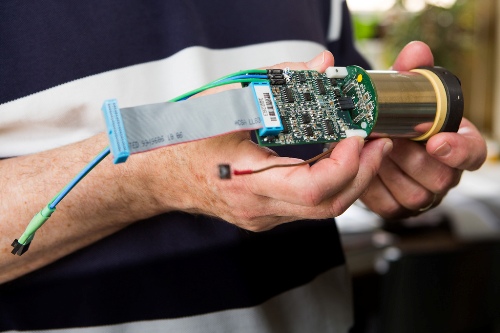This summer, particle physicist at the University of Chicago (UChicago) and researchers at the Large Hadron Collider (LHC) in Geneva reported the discovery of a new particle having a mass between 125-126 GeV, a value lies between the estimated range for the sought-after particle dubbed the Higgs boson.
 Members of UChicago’s ATLAS team designed and built 10,000 of these electronic components for the Large Hadron Collider’s calorimeter, which measures particle energies. (Jason Smith)
Members of UChicago’s ATLAS team designed and built 10,000 of these electronic components for the Large Hadron Collider’s calorimeter, which measures particle energies. (Jason Smith)
For over twenty years, physicists across the world have been exploring the exotic Higgs boson particle. According to theorists, the universe will not have either atoms, elements, stars or people without the Higgs boson particle.
Physics Professor, Henry Frisch, who is also a member of the Collider Detector at Fermilab partnership, stated that the finding of this new particle is just a beginning as the researchers are still not able to understand what type of particle it is.
The new particle may be the last missing link of the Standard Model of particle physics that explains the basic behavior and structure of an ordinary matter. Or the thing may be the elusive supersymmetric Higgs that helps understand the secrets of dark energy and dark matter. Physics Professor, James Pilcher and part of the A Toroidal LHC ApparatuS collaboration at the LHC, stated that the LHC physicists are so far not able to find supersymmetry, which may be hiding in an elusive corner that is still not explored.
According to Frank Merritt, Physics Professor and UChicago ATLAS collaborator, a new era is beginning and it is the time to go beyond the Standard Model. Whatever may be the result whether it is a supersymmetry or something else, the exploration will be very interesting. A key component of this analysis will be the grid computing techniques devised at UChicago and Argonne National Laboratory. Using the grid computing methods to analyze the data gleaned since 2011, the researchers were able to identify the mass of the new particle.
Ian Foster, Computation Institute Director, who contributed in the development of grid computing, stated that the discovery of the new particle was not possible without the LHC Computing Grid. Grid computing enables people to distribute computer power, online tools and databases securely and autonomously across geographic and organizational frontiers.